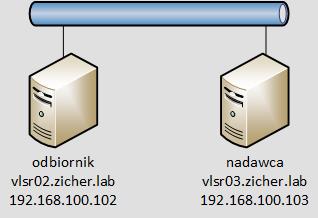[23] Przepustowość sieci
7 lutego 2021Zainstaluj [iperf], aby sprawdzić przepustowość sieci. Wymaga 2 hostów, hosta nadawcy i hosta odbiornika.
Schemat sieci przedstawia się następująco:

[1] Zainstaluj [iperf3] na każdym z hostów.
[root@vlsr02 ~]# dnf install iperf3
[2] Jeśli jest zainstalowany Firewalld zezwól na ruch na porcie [5201] na obu hostach.
[root@vlsr02 ~]# firewall-cmd --add-port=5201/tcp --permanent [root@vlsr02 ~]# firewall-cmd –reload
[3] Uruchom poniższą komendę na hoście odbiorniku.
[root@vlsr02 ~]# iperf3 -s ----------------------------------------------------------- Server listening on 5201 -----------------------------------------------------------
[4] Sprawdź przepustowość sieci uruchamiając poniższą komendę na hoście nadawcy. Poniższy test pokazuje: w czasie testu przez sieć przesłano 27,1GBajta, zaś przepustowość sieci kształtowała się na poziomie 23,1GBita/sekundę.
[root@vlsr03 ~]# iperf3 -c vlsr02.zicher.lab Connecting to host vlsr02.zicher.lab, port 5201 [ 5] local 192.168.100.103 port 42196 connected to 192.168.100.102 port 5201 [ ID] Interval Transfer Bitrate Retr Cwnd [ 5] 0.00-1.00 sec 2.30 GBytes 19.8 Gbits/sec 0 1.03 MBytes [ 5] 1.00-2.00 sec 2.74 GBytes 23.5 Gbits/sec 0 1.14 MBytes [ 5] 2.00-3.00 sec 2.77 GBytes 23.8 Gbits/sec 0 1.14 MBytes [ 5] 3.00-4.00 sec 2.77 GBytes 23.8 Gbits/sec 0 1.14 MBytes [ 5] 4.00-5.00 sec 2.75 GBytes 23.6 Gbits/sec 0 1.14 MBytes [ 5] 5.00-6.00 sec 2.76 GBytes 23.7 Gbits/sec 0 1.14 MBytes [ 5] 6.00-7.00 sec 2.75 GBytes 23.6 Gbits/sec 0 1.14 MBytes [ 5] 7.00-8.00 sec 2.75 GBytes 23.6 Gbits/sec 0 1.14 MBytes [ 5] 8.00-9.00 sec 2.74 GBytes 23.5 Gbits/sec 0 1.14 MBytes [ 5] 9.00-10.00 sec 2.73 GBytes 23.4 Gbits/sec 0 1.14 MBytes - - - - - - - - - - - - - - - - - - - - - - - - - [ ID] Interval Transfer Bitrate Retr [ 5] 0.00-10.00 sec 27.1 GBytes 23.2 Gbits/sec 0 sender [ 5] 0.00-10.00 sec 27.1 GBytes 23.2 Gbits/sec receiver iperf Done.
[5] Możliwe jest dokładniejsze i bardziej rozbudowane sprawdzenie sieci, używając różnych opcji i przełączników.
[root@vlsr02 ~]# iperf3 --help Usage: iperf3 [-s|-c host] [options] iperf3 [-h|--help] [-v|--version] Server or Client: -p, --port # server port to listen on/connect to -f, --format [kmgtKMGT] format to report: Kbits, Mbits, Gbits, Tbits -i, --interval # seconds between periodic throughput reports -F, --file name xmit/recv the specified file -A, --affinity n/n,m set CPU affinity -B, --bind <host> bind to the interface associated with the address <host> -V, --verbose more detailed output -J, --json output in JSON format --logfile f send output to a log file --forceflush force flushing output at every interval -d, --debug emit debugging output -v, --version show version information and quit -h, --help show this message and quit Server specific: -s, --server run in server mode -D, --daemon run the server as a daemon -I, --pidfile file write PID file -1, --one-off handle one client connection then exit --rsa-private-key-path path to the RSA private key used to decrypt authentication credentials --authorized-users-path path to the configuration file containing user credentials Client specific: -c, --client <host> run in client mode, connecting to <host> --sctp use SCTP rather than TCP -X, --xbind <name> bind SCTP association to links --nstreams # number of SCTP streams -u, --udp use UDP rather than TCP --connect-timeout # timeout for control connection setup (ms) -b, --bitrate #[KMG][/#] target bitrate in bits/sec (0 for unlimited) (default 1 Mbit/sec for UDP, unlimited for TCP) (optional slash and packet count for burst mode) --pacing-timer #[KMG] set the timing for pacing, in microseconds (default 1000) --fq-rate #[KMG] enable fair-queuing based socket pacing in bits/sec (Linux only) -t, --time # time in seconds to transmit for (default 10 secs) -n, --bytes #[KMG] number of bytes to transmit (instead of -t) -k, --blockcount #[KMG] number of blocks (packets) to transmit (instead of -t or -n) -l, --length #[KMG] length of buffer to read or write (default 128 KB for TCP, dynamic or 1460 for UDP) --cport <port> bind to a specific client port (TCP and UDP, default: ephemeral port) -P, --parallel # number of parallel client streams to run -R, --reverse run in reverse mode (server sends, client receives) -w, --window #[KMG] set window size / socket buffer size -C, --congestion <algo> set TCP congestion control algorithm (Linux and FreeBSD only) -M, --set-mss # set TCP/SCTP maximum segment size (MTU - 40 bytes) -N, --no-delay set TCP/SCTP no delay, disabling Nagle's Algorithm -4, --version4 only use IPv4 -6, --version6 only use IPv6 -S, --tos N set the IP type of service, 0-255. The usual prefixes for octal and hex can be used, i.e. 52, 064 and 0x34 all specify the same value. --dscp N or --dscp val set the IP dscp value, either 0-63 or symbolic. Numeric values can be specified in decimal, octal and hex (see --tos above). -L, --flowlabel N set the IPv6 flow label (only supported on Linux) -Z, --zerocopy use a 'zero copy' method of sending data -O, --omit N omit the first n seconds -T, --title str prefix every output line with this string --get-server-output get results from server --udp-counters-64bit use 64-bit counters in UDP test packets --username username for authentication --rsa-public-key-path path to the RSA public key used to encrypt authentication credentials [KMG] indicates options that support a K/M/G suffix for kilo-, mega-, or giga- iperf3 homepage at: http://software.es.net/iperf/ Report bugs to: https://github.com/esnet/iperf